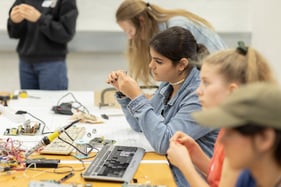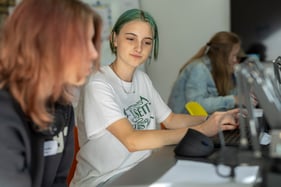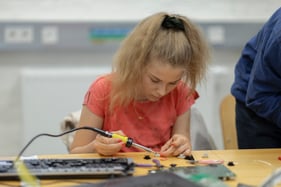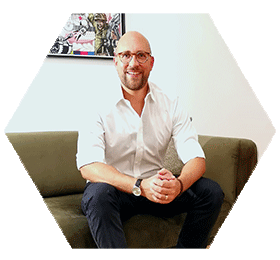Anyone who, like Jugend hackt, confidently claims to want to make the world a better place should of course make sure that as many people as possible are involved. Ten years of experience have shown that simply opening a registration period and inviting all young people 12 to 18 years of age to participate is not enough.
Were this to happen, the event's attendees would be over 90 percent male. They would certainly have a good time, but it wouldn't be representative of society. As Jana, a long-time participant (now a student) once put it :"Who sits at the table and contributes a female perspective? How do we want our digital world to be shaped, and by whom?"
Despite all the effort that's been made, gender roles aren't going away. When it comes to IT and coding, most boys (or their parents) don't hesitate to say that the subject is for them. For years, thanks to active countermeasures, Jugend hackt has managed to achieve a quota of 25 to 30 percent girls at events. This is achieved by actively approaching people, cooperating with suitable partners, using female role models and ultimately, by selecting who can participate in events with high demand.
A weekend just for girls, as well as intersex, nonbinary, trans and agender youth
Another approach is to offer more events aimed at girls as well as intersex, nonbinary, trans and agender youth (MINTAs in German). Anyone who can nod in response to all these terms already knows a lot about queer issues. For Jugend hackt, it is also important to offer a place to young people who find themselves between and outside the gender binary.
The first weekend event for MINTAs took place in Jülich at the beginning of 2020 and had 17 participants. At the time, the focus was on exchanging ideas, trying things out and learning new skills, though the idea of empowerment also received lots of attention. Of course, a one-off event is not enough, which is why recurring offerings for MINTAs have been launched at several Jugend hackt locations this year - in Dresden, Berlin and Potsdam.
The first Girls Hackday took place at Dresden's Kraftwerk Mitte in the fall of 2023, with 22 participants. A particular concern for the three organizers was to focus on the female perspective with respect to technology and programming. The participants were able to gain insight into the various areas of coding, play games together, tinker, program, and listen to the stories and biographies of the 12 speakers. In short: It was lots of fun for everyone involved. For this reason, the Girls Hackday in Dresden will be held again in 2024.
For Katja Lauth, who runs the Berlin Jugend hackt lab, it is also important to reach girls and queer young people. Among other things, she offers taster workshops as part of the Berlin "Girls' Technology Congress." In November, she also hosted the first "Soldering and 3D printing for girls, intersex and trans people, non-binary and agender people."
A safer space for girls, as well as intersex, nonbinary, trans and agender youth
"This lab session had a very relaxed and exuberant atmosphere. The MINTAs seemed much braver, more self-confident and more open-minded in this Safer Space than in other lab sessions, where cis boys make up the majority of participants," says Lauth.
Jugend hackt's new Lab Potsdam, which has been offering workshops since the beginning of November, goes one step further. The organizers have decided to offer a strictly MINTA Lab at one of the three locations, the Medienwerkstatt Potsdam, instead of "every now and then." In other words, you can count on them doing it every two weeks. Li Grunewald runs Lab Potsdam and wants to create "a relaxed space for learning, experimenting and networking."
Based on the many individual experiences in the Jugend hackt network, further handouts are planned for 2024 on how offerings for girls, inter, non-binary, trans and agender young people can be created for even more locations. The first building block is a flyer for the target group, which is currently being developed by the team.



Photos: CC BY Jugend hackt Dresden
Jugend hackt is a program for young people who want to use their technical skills to improve the world. Supported by volunteer mentors, participants develop digital tools, prototypes, and plans for a better future. Jugend hackt's offering includes hackathon events in many cities, regional labs, an online community, and international exchange programs.
adesso insurance solutions supports the program as a sponsor.
You can find more blog posts about Jugend hackt here.

